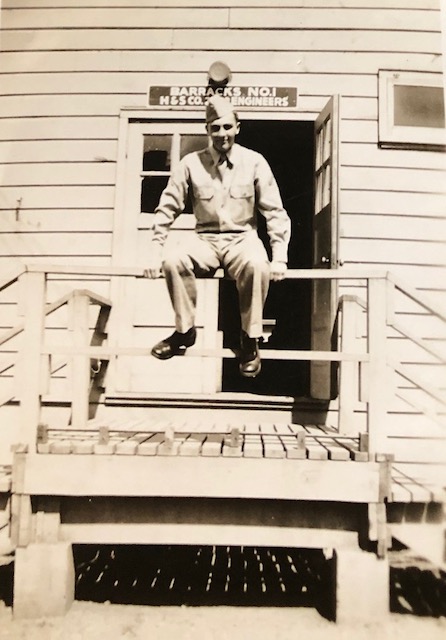
In honor of Memorial Day, we invited members of our families to share their experiences in service to the United States. Here’s what Julie’s father, John N. ‘Jack’ O’Neill, 95, of Pittsford, NY, wrote to us about his time as a combat engineer in World War II, service that began shortly after he graduated from Aquinas Institute of Rochester in 1942 :
Having spent my first year in U.S. Army locations in, Oregon, Washington and Florida learning what was expected of a combat engineer, I boarded a ship bound for England.
After a few months instruction there in demolition and invasion tactics, it became apparent that D-Day was scheduled. Persons from our unit, the 299 Engineer Combat Battalion, were selected to be among the first wave to capture Omaha Beach, in Normandy France.
On D-Day a significant number of friends were casualties in the period of time before the beach was secured. I arrived on Omaha in a leaking landing craft after our troops had advanced and forced the German army from the beachhead.
Heavy combat continued with the capture of French towns and villages. In a matter of months, Paris was captured and I happened to be an early arrival to witness the welcome of allied forces from thousands of the city population.
The U.S. continued to advance capturing Luxembourg and Belgium. I traveled with a Combat Command and experienced reviewing the properties recently captured and how they could be used by our troops following.
Germany, having used V-1 and V-2 rockets in Great Britain started using them in the areas now occupied by the U.S. While in Spa, Belgium hearing the arrival of V-1s was OK if power noise continued. If it stopped the explosion was near. We did have some casualties.
While in the town of Hassult, a V-2 a missile without noise landed near the population. Being the only military person handy, the town mayor requested I examine the remains to make sure no explosive would be active. Accompanied by the town mayor I did so, and in handling the parts, found that my hands would not tolerate the acid coated debris. The village MD medicated my problems with no serious results.
Late in the war, Germany chose to attack U.S. forces during the severe winter. Records show early success by Germany, including surrounding the town of Bastogne. During that December I was stationed at 299th Headquarters in St. Trond. I was ordered to proceed with a vehicle
driver to 1st Army Headquarters in Spa, Belgium to retrieve mine detector batteries.
Unbeknownst to 299th Headquarters, 1st Army Headquarters had withdrawn from its position in Spa due to the German advance. Arriving at Spa, I was told to leave and avoid my arrival route, on which I had passed very close to Bastogne. Bastogne had by that time become surrounded by German forces.
Fortunately, my journey to Spa had avoided German forces by what may have been hours. The warning by personnel at Spa allowed me to take an alternate route that avoided Bastogne on my way back to St. Trond. On the return journey, the driver and I encountered personnel from 299th engineers, and enabled me to return to 299th HQ in time for Christmas.
Following Christmas, the battalion proceeded to the Rhine River at the Lundendorff bridge, still under control of German forces. The location enabled us to witness the attempt by the German Air Force to prevent the re-taking of the bridge by U.S. forces.
Ultimately the U.S. forces were able to prevail there and enabled us to move troops across. From there we moved into Germany, and made our way to Berlin, which was captured and
brought about the surrender of Germany in the spring of 1945.
After the surrender, some personnel from the 299th were transferred to various other units or sent home, while others went on to the Pacific. I myself was transferred to a small company consisting mainly of recent arrivals in the European Theater. The company commander recognized that his group was fresh off the boat and bound for the Pacific. He was gracious enough to transfer me to another combat engineer company that was scheduled to shortly go home.
I arrived back in the US in time for Christmas, 1945. That same month I would turn 21 years old.
If you have a story about military service that you’d like to share, please contact us at editor@shelterislandgazette.com.




